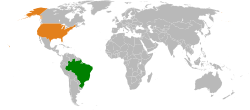Hubungan Amerika Serikat dengan Brasil
 |
|
Brasil |
Amerika Serikat |
|---|---|
| Misi diplomatik | |
| Kedutaan Besar Brasil, Washington, D.C. | Kedutaan Besar Amerika Serikat, Brasília |
| Utusan | |
| Duta Besar Brasil untuk Amerika Serikat Nestor Forster | Duta Besar Amerika Serikat untuk Brasil Todd C. Chapman |

Hubungan Amerika Serikat dengan Brasil (Portugis Brasil: Relações Brasil-Estados Unidos) adalah hubungan bilateral antara Amerika Serikat dan Brasil. Amerika Serikat adalah negara pertama yang mengakui kemerdekaan Brasil, dan Brasil adalah satu-satunya negara Amerika Serikat yang mengirim pasukan untuk berjuang bersama dengan Sekutu pada Perang Dunia II.
Referensi[sunting | sunting sumber]
Bacaan tambahan[sunting | sunting sumber]
- Adamson, Matthew, and Simone Turchetti. "Friends in fission: US–Brazil relations and the global stresses of atomic energy, 1945–1955." Centaurus 63.1 (2021): 51-66. online[pranala nonaktif permanen]
- Bandeira, Luiz Alberto Moniz. "Brazil as a regional power and its relations with the United States." Latin American Perspectives 33.3 (2006): 12-27.
- Bodman, Samuel W., Julia Sweig, and James D. Wolfensohn. Global Brazil and US-Brazil Relations (Council on Foreign Relations, 2011). online
- Cameron, James. "US-Brazil Relations." in Oxford Research Encyclopedia of American History (2019) https://doi.org/10.1093/acrefore/9780199329175.013.659
- Davis, Sonny B. A Brotherhood of Arms: Brazil-United States Military Relations, 1945-1977 (U Press of Colorado, 1996).
- Fouad, Sam HL, and Raul Gouvea. "The US–Brazil relationship opportunity: Business synergies for a dynamic global environment." Thunderbird International Business Review 60.4 (2018): 497-510.
- Haines, Gerald K. The Americanization of Brazil: A study of US Cold War diplomacy in the third world, 1945-1954 (1989).
- Hilton, Stanley E. "The United States, Brazil, and the Cold War, 1945-1960: end of the special relationship." Journal of American History 68.3 (1981): 599-624. online
- Long, Tom. "The US, Brazil and Latin America: the dynamics of asymmetrical regionalism." Contemporary Politics 24.1 (2018): 113-129. online
- Lowenthal, Abraham F. Brazil and the United States Foreign Policy Assn, (1986).
- McCann, Frank. "The Rise and Fall of the Brazilian-American Military Alliance, 1942-1977." Esboços-Revista do Programa de Pós-Graduação em História da UFSC 22.34 (2016): 13–60. online
- Pitts, Bryan. "The Empire Strikes Back: US-Brazil Relations from Obama to Trump 1." in The Future of US Empire in the Americas (Routledge, 2020) pp. 165-187.
- Smith, Joseph. Brazil and the United States: Convergence and Divergence (U of Georgia Press; 2010), 256 pages
- Teixeira, Carlos Gustavo Poggio. Brazil, the United States, and the South American subsystem: regional politics and the absent empire (Lexington Books, 2012).
- Topik, Steven C. Trade and gunboats: the United States and Brazil in the age of empire (Stanford University Press, 1996).
- Tota, Antonio Pedro. The Seduction of Brazil: The Americanization of Brazil During World War II (U of Texas Press, 2010).
- Wasserman, Renata. Exotic Nations: Literature and Cultural Identity in the United States and Brazil, 1830–1930 (Cornell University Press, 2018).
- Weis, W. Michael. "The twilight of pan-Americanism: The alliance for progress, neo-colonialism, and non-alignment in Brazil, 1961–1964." International History Review 23.2 (2001): 322-344.
- Wesson, Robert G. The United States and Brazil: limits of influence (Praeger Publishers, 1981).


